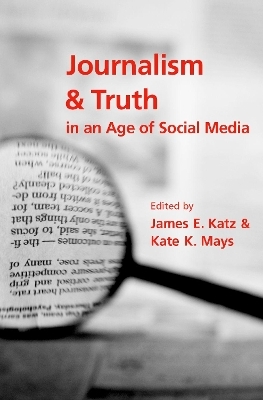
Journalism and Truth in an Age of Social Media
Oxford University Press Inc (Verlag)
978-0-19-090025-0 (ISBN)
This volume aims to illuminate the contentious media landscape to help journalism students, scholars, and professionals understand contemporary conditions and arm them to deal with a spectrum of new developments ranging from technology and politics to best practices.
Fake news is among the greatest of these concerns, and can encompass everything from sarcastic or ironic humor to bot-generated, made-up stories. It can also include the pernicious transmission of selected, biased facts, the use of incomplete or misleadingly selective framing of stories, and photographs that editorially convey certain characteristics. This edited volume contextualizes the current "fake news problem." Yet it also offers a larger perspective on what seems to be uniquely modern, computer-driven problems. We must remember that we have lived with the problem of people having to identify, characterize, and communicate the truth about the world around them for millennia.
Rather than identify a single culprit for disseminating misinformation, this volume examines how news is perceived and identified, how news is presented to the public, and how the public responds to news. It considers social media's effect on the craft of journalism, as well as the growing role of algorithms, big data, and automatic content-production regimes. As an edited collection, this volume gathers leading scholars in the fields of journalism and communication studies, philosophy, and the social sciences to address critical questions of how we should understand journalism's changing landscape as it relates to fundamental questions about the role of truth and information in society.
James E. Katz is Feld Professor of Emerging Media at Boston University's College of Communication, where he directs its Division of Emerging Media Studies. He has been awarded a Distinguished Fulbright Chair to Italy, fellowships at Princeton, Harvard, and MIT, and the Ogburn Career Achievement Award from the American Sociological Association. Dr. Katz is an elected fellow of the International Communication Association and the American Association for the Advancement of Science (AAAS). Kate K. Mays is completing her PhD in Emerging Media Studies at Boston University's College of Communication and is a Graduate Student Fellow for computational and data-driven research at the Rafik B. Hariri Institute for Computing and Computational Science & Engineering at Boston University. She has presented her research findings at a variety of international conferences and in several journals. After graduating from Georgetown University, she worked in the publishing industry before coming to Boston University for advanced studies.
List of Contributors
Acknowledgements
Preface
Chapter 1. Introduction
James E. Katz and Kate K. Mays
Democracy, News, & Society
Chapter 2. Belgium Invades Germany: Can Facts Survive Politics?
Michael Schudson
Spotlight: Pierre Bourdieu and the Journalistic Field
David L. Swartz
Chapter 3. From information availability to factual accountability: Reconsidering how truth matters for politicians, publics, and the news media
Lucas Graves and Chris Wells
Chapter 4. Fake News: A New Obsession with an Old Phenomenon?
Nicole Krause, Christopher D. Wirz, Dietram A. Scheufele, Michael Xenos
Pillars of Truth in Journalism
Spotlight: Sophisticated Modernism & Truth
Edward Schiappa
Chapter 5. "The True" in Journalism
Juliet Floyd
Chapter 6. Truth in Journalism
Zeynep Soysal
Craft of Journalism and Truth
Chapter 7. Canards, fausses nouvelles, paranoid style. Classic authors for an emerging phenomenon
Peppino Ortoleva
Chapter 8. Scoop: The Challenge of Foreign Correspondence
John Maxwell Hamilton and Heidi Tworek
Chapter 9. Searching for Truth in Fragmented Spaces: Chat Apps and Verification in News Production
Colin Agur and Valerie Belair-Gagnon
Chapter 10. The use and verification of online sources in the news production process.
Sophie Lecheler, Sanne Kruikemeier, Yael de Haan
Chapter 11. Technological Affordances can Promote Misinformation: What Journalists Should Watch Out for When Relying on Online Tools and Social Media
Maria D. Molina and S. Shyam Sundar
Reception & Perception
Chapter 12. Fake News Finds an Audience
Erik P. Bucy and John E. Newhagen
Chapter 13. Truth at large: When social media investigations get it wrong
Edson C. Tandoc Jr.
Chapter 14. Emotional Characteristics of Social Media and Political Misperceptions
Brian E. Weeks and R. Kelly Garrett
Chapter 15. Conclusion
Kate K. Mays and James E. Katz
| Erscheinungsdatum | 02.08.2019 |
|---|---|
| Verlagsort | New York |
| Sprache | englisch |
| Maße | 239 x 160 mm |
| Gewicht | 570 g |
| Themenwelt | Sozialwissenschaften ► Kommunikation / Medien ► Journalistik |
| Sozialwissenschaften ► Kommunikation / Medien ► Kommunikationswissenschaft | |
| Sozialwissenschaften ► Politik / Verwaltung ► Vergleichende Politikwissenschaften | |
| ISBN-10 | 0-19-090025-3 / 0190900253 |
| ISBN-13 | 978-0-19-090025-0 / 9780190900250 |
| Zustand | Neuware |
| Haben Sie eine Frage zum Produkt? |
aus dem Bereich


